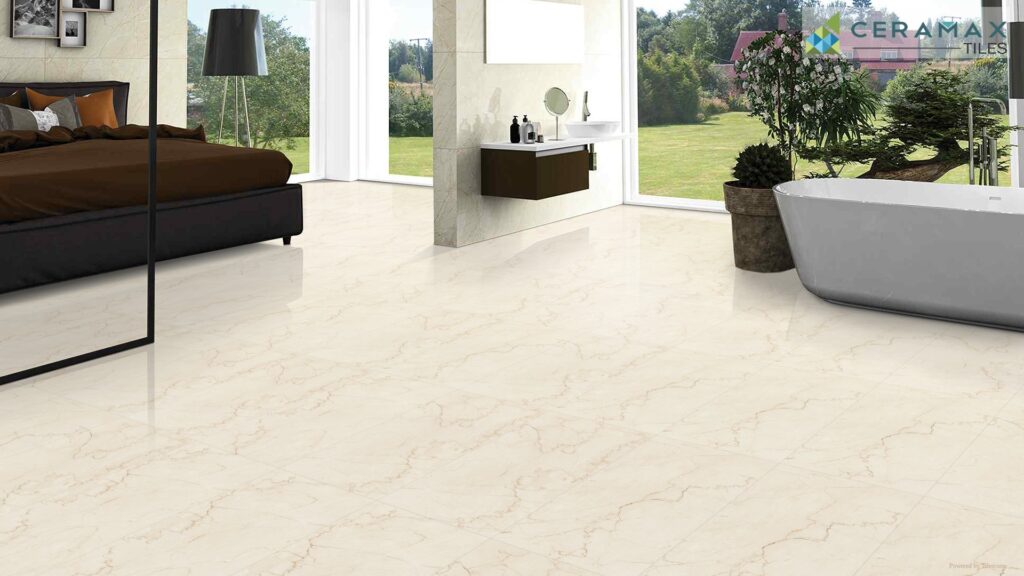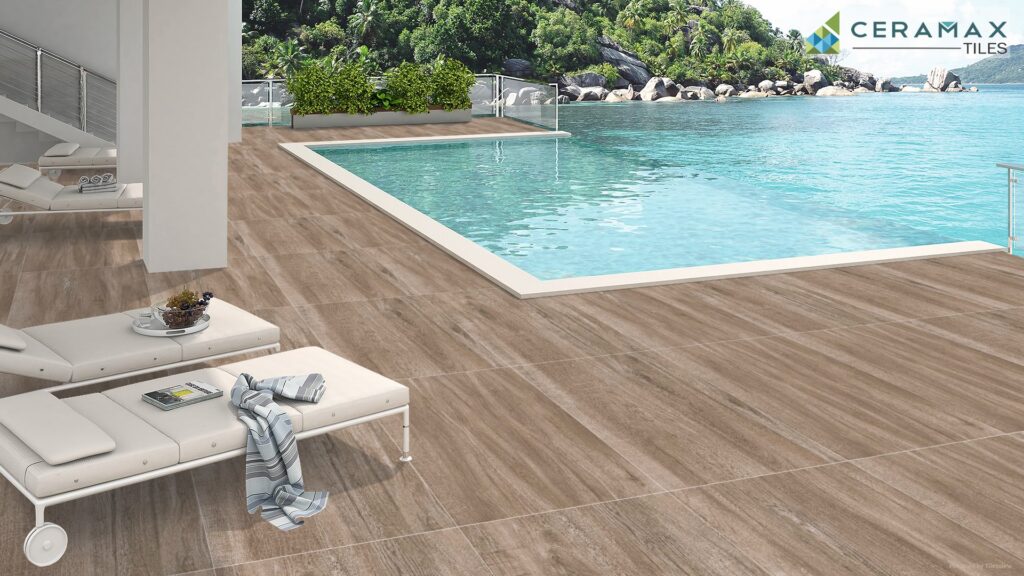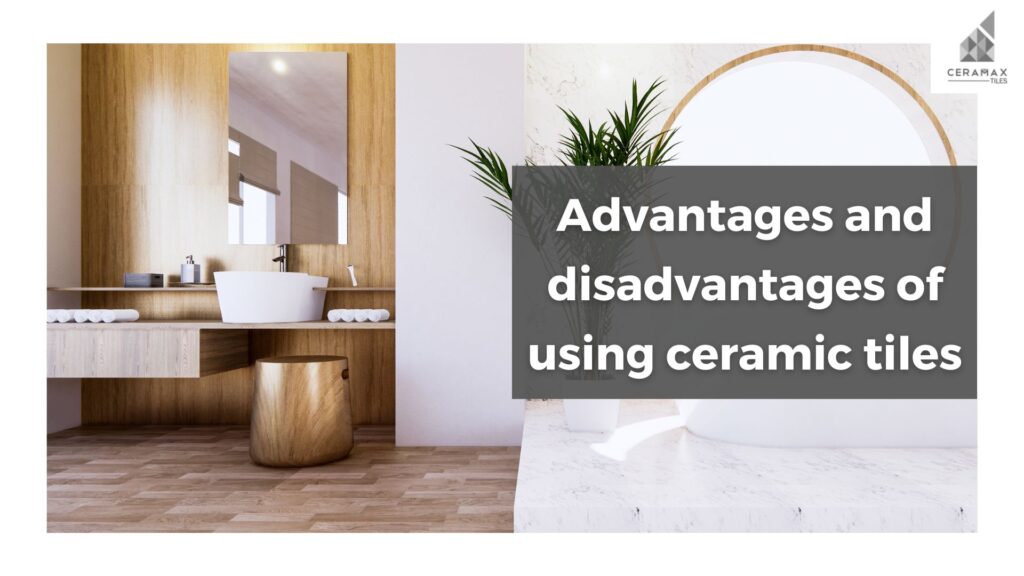ADVANTAGES & DISADVANTAGES OF CERAMIC TILES
There is a reason for the immense popularity of tiles in the world of construction. Today, it is impossible to envision constructing a home without the use of tiles. They have left no element of the construction process untouched, from our kitchen to our bathroom, and from our flooring to our walls, we can see tiles everywhere. And tiles will continue to hold a significant role in the world of building for a very long time due to their affordability, diversity, and ease of use. One such tile is Ceramic Tiles.
Ceramic tiles are commonly used for flooring, walls, worktops, backsplashes, and bathrooms. Ceramic tile may be the only flooring option that works in every area of the house. These tiles have a firm, solid surface that will not collect or retain dirt, dust, pollen, or other allergens. Ceramic tiles are also popular among homeowners and tile installers. That is because of its classic appearance and a vast selection of potential designs. Though ceramic floor tiles are becoming more popular in India, keep in mind that this sort of tile has its own set of advantages and disadvantages.
With that, let us go straight into the advantages and disadvantages of ceramic tiles.
ADVANTAGES OF CERAMIC TILES:

DURABILITY:
Ceramic tiles are super strong, long-lasting, and abrasion-resistant. If you have a professional installation, the tiles can last up to 20 years or even longer if you maintain them properly. Even if one tile cracks, it is usually due to a hard impact, and you will find it simple to repair one tile. As a result, you’ll be able to keep your overall costs low because you won’t have to replace tiles on a regular basis.
LOW MAINTENANCE:
One of the things that people like best about tile flooring is how simple it is to keep clean. If any stains, dirt, or liquids get on it, they will all sit on top and not be absorbed, making it easy to clean. You can keep them clean by sweeping any loose debris and dirt off the floor using a vacuum with a soft brush attachment or a broom. If stains do occur, nearly any cleaner may be used without damaging the tile flooring. As a result, many homeowners choose to install ceramic tile in their bathrooms and kitchens.
WATER- RESISTANT:
Another reason for using ceramic tile flooring is that it is water-resistant. The material has a protective layer on top that makes it stain- and water-resistant; this is especially essential in bathrooms and kitchens, where the ceramic tile will endure considerably longer than other materials. It also withstands high humid conditions, so you don’t have to worry about it being damaged during the hot and humid summer months. Ceramic tiles will be suitable in any wet climate.
WIDE RANGE OF PRODUCTS:
Ceramic tiles are available in a wide range of colours, textures, and styles, and patterns can be made using flexible tile sizes. They may also be printed to look like numerous hardwoods and natural stones. They are adaptable to nearly any colour scheme or theme. We can now print anything on ceramic tiles thanks to the advancement of digital printing technology. Ceramax Tiles has ceramic tiles in countless designs & colours. You will definitely find something you like over there.
PREVENTS THE GROWTH OF GERMS:
The ceramic tile floor is not only easy to clean, but it also does not harbour germs. This characteristic of ceramic tiles is advantageous for running a public-service business, such as a restaurant. Ceramic tiles’ hard surface makes them impermeable, which means they are resistant to water and moisture, making them less prone to germs and moulds.

DISADVANTAGES OF CERAMIC TILES:
COLD:
The ceramics tile flooring does not absorb or retain heat effectively; it can get rather chilly in the winter. That is crucial to consider if you want to install tiles in a public area of your business where your customers would feel uncomfortable. One advantage of this is that it will feel fantastic in the summer when people tread on the cool floor while it is sweltering outside.
HEAVY:
Because ceramic tile flooring is heavy, it is not a good choice for upper-story installations. If it is essential to install tile flooring on the top level of a commercial building, a specialist should first inspect the structural integrity. You must ensure that you are not subjecting your building to additional stress that it is unable to bear.
HARD:
Ceramic tiles may be durable and easier to maintain. However, the hard surface makes standing on the floor for extended periods of time unpleasant. Unfortunately, cushioned underlay cannot be used to soften hard ceramic tiles. Ceramic tile impacts can be mitigated by placing soft rugs on such floors.
INSTALLATION:
Ceramic tiles are heavier and harder than regular tiles. As a result, be certain that these tiles are handled with care and that the required equipment is used. As a result, experienced tile installers are required to install ceramic tiles.
Considering the ceramic tiles advantages and disadvantages, we can say that the pros overweigh the cons. You can simply add some rugs around the house to make ceramic tiles comfortable for your feet. And don’t worry about where you can install ceramic tiles; you can choose ceramic tiles for basically every room.





